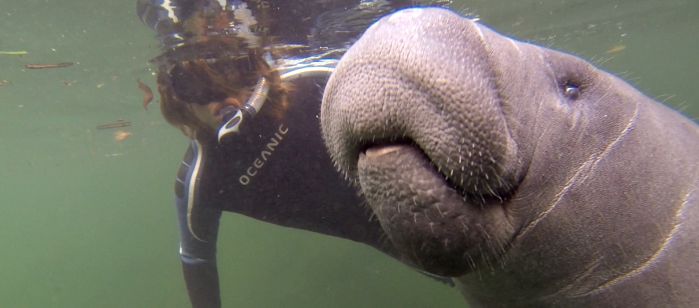The Florida manatee (Trichechus manatus latirostrus) is a large, slow-moving marine mammal that inhabits the coastal bays, estuaries, and rivers in the southeastern United States. They are a threatened tropical species, most related species being found endemic to regions near the equator. Manatees found in the United States are in their northernmost habitat.
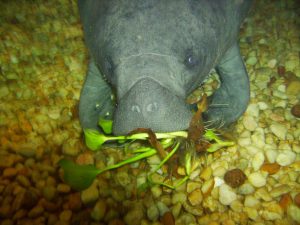
During the winter months here when water temperatures drop, they are subject to the effects of hypothermia, frostbite, and pneumonia in a condition termed “cold stress syndrome.” Their tolerance threshold for exhibiting signs of cold stress is right around 20 degrees Celsius (68 degrees Fahrenheit). To avoid problems during the cooler months, manatees travel to natural and artificial sources of warm water. Among these warm-water sources are the artesian springs that are found throughout Florida. Crystal River, located in Citrus County, is one of the most popular sites manatees use during the winter months of November through March, and the number of animals wintering in Crystal River is increasing. Artificial sources of warmth at power plant discharge canals are facing closure because aging plants are shutting down. Natural sources like the springs at Crystal River will become even more important for sustaining the manatee populations during the cold months.
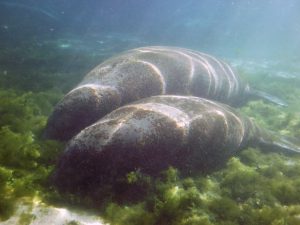
Manatees are friendly, charismatic, and playful, making them a target for tourists seeking a close-up wildlife encounter. Crystal River is by far the most popular destination for divers to view manatees in the wild. Within Crystal River is an area called Three Sisters Springs, which is characterized by clear, blue water that is filtered and heated within the earth. Water is discharged through the aquifer at 22 – 24 degrees Celsius (72 – 74 degrees Fahrenheit) year-round. This temperature allows the manatees to use this area to rest in a refuge away from the cold. However, they’re not alone.
In 2011, the United States Fish and Wildlife Service estimated that over 125,000 people visited Three Sisters Springs to see manatees, with over 93,000 visitors being transported by local dive shops and tour guides. In one day, 428 swimmers, snorkelers, divers, and kayakers were counted within an eight hour period. Though these interactions are beneficial for educating the public, they do not always have a positive effect on the manatees.
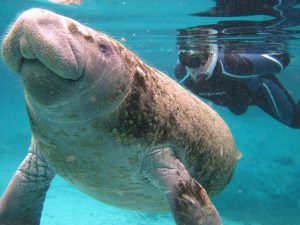
Swimmers and snorkelers who wish to get an up-close, in-water view of these creatures can cause problems for these endangered animals. With so many people in such a small area, the manatees are often disturbed. They can become cornered as swimmers try to pet and grab at the resting animals. This interference may even change the manatees’ natural behavior patterns and cause the animals to leave the warm water of the spring run in order to find a peaceful resting place elsewhere. Furthermore, swimmers and snorkelers that may not be experienced or comfortable in the water exhibit poor skills and can unwittingly stand upon, kick, or startle the animals that are not used to excessive noise and splashing. The most problematic circumstance occurs when swimmers separate calves from their mothers. Young manatees are dependent on their mothers for their first two years of life and need the warmth of these springs to thermoregulate. These interactions with people can place unnecessary stress on young manatees, and separation from their mothers could be deadly. All of these circumstances are considered harassment and are against Florida state and federal laws.
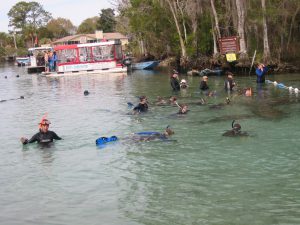
Manatees provide an important economic resource for Citrus County. As people visit the area, they spend money supporting the economy and local businesses, so the solution may not be to stop human interaction with the manatees, but perhaps to limit the number of persons with access to the animals at a given time. There are also a number of steps that swimmers and kayakers can take to reduce harassment and disturbance to the manatees.
Snorkelers who just float on the surface, away from the animals, may actually be the ones who get the most rewarding encounter. Manatees are curious by nature and your being passive may gain their interest and rouse the animals to approach on their own terms.
Keeping these important things in mind limits harassment, and manatees will be able to utilize these natural springs that are imperative for their survival when the weather gets cold. Educating dive communities and the public is necessary to make sure that interactions can be rewarding for both people and manatees. With guidelines in place, everyone will be able to enjoy these remarkable marine mammals for many years to come.


